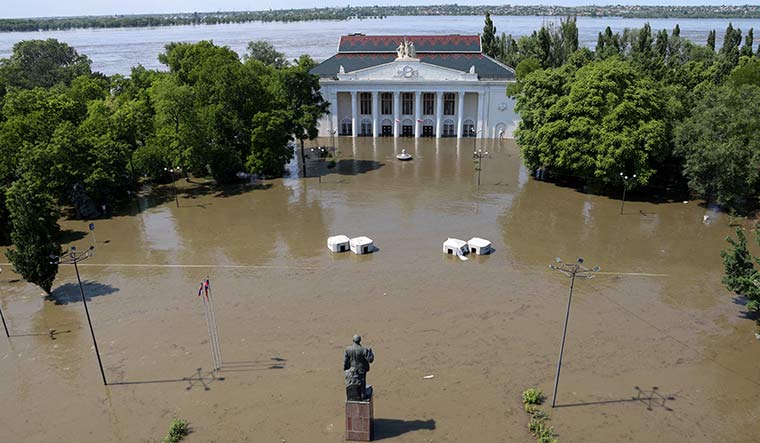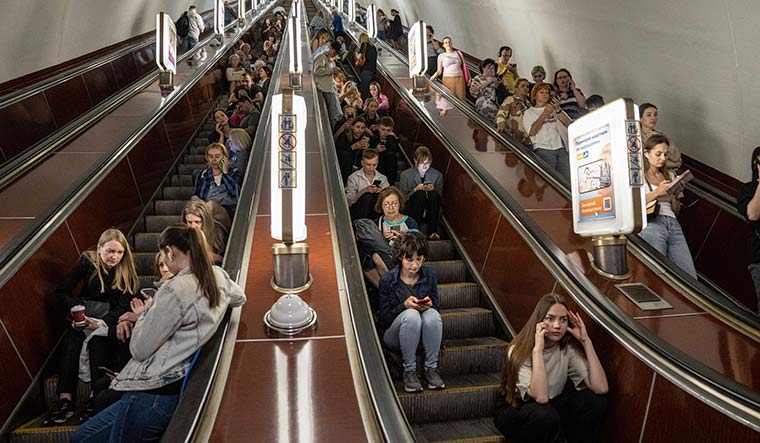BACK IN MAY-JUNE 1989, when tanks rolled out on Tiananmen Square to crush the movement of the Chinese youth for political reforms, their hopes for change were high, in view of the normalisation of relations with the Soviet Union during Mikhail Gorbachev’s visit after a freeze of 30 years. But what happened ultimately was quite the opposite. “Let us close the past and open a new future,” Chinese supremo Deng Xiaoping told Gorbachev. The latter agreed, notwithstanding the mounting tension on Tiananmen and in several other cities. Future was opened for the rulers of China and the Soviet Union and later, Russia, without breaking ground for the people.
That same year, Europe witnessed groundbreaking changes. In the former republics of the Soviet Union and in east Europe, the spirit of citizens’ resilience exposed the futility of totalitarian systems as unsustainable forms of governance, leading to the fall of the Berlin Wall and also a sea change across eastern Europe. Many leaders could not fathom the depth of the changes. British prime minister Margaret Thatcher and French president Francois Mitterrand were wary of the rise of a unified, strong Germany, a fear that loomed large in Europe after World War II. They tried to convince Gorbachev to react politically against the fall of the Wall.
Gorbachev had neither the intent nor the capacity to act against the wave of change, hammering the last nail in the coffin of the Brezhnev doctrine, which legitimised interventions in countries where socialist rulers were threatened by mass movements. In fact, the Soviet leadership was quite careful and was against direct intervention in Europe after their bitter taste of the 1968 Prague Spring and especially after their entry into Afghanistan in 1979. Even during the 1980-1981 uprisings in Poland, neither the Soviet Union nor the Warsaw Pact engaged in direct intervention, limiting it to orchestration from a distance, whereby the Poles themselves were handling the situation by imposing martial law. Russia is not so careful today.
Envisioning a post-bipolar world after the end of the Cold War, the collapse of the Soviet Union led to 15 new states, all building their statehood, market economy and multiparty democracy, which was a serious transition from non-state peripheral entities, state-controlled planned economy and single party rule. For the three Baltic States, whose statehood was nullified after their inclusion in the Soviet Union under the Molotov-Ribbentrop pact, the choice of policies in favour of the EU and NATO was clear. For the other 12 republics, building the outer attributes of statehood and market was easier than that of democracy. Crony capitalism and the oligarchic model benefited the few who were owners of resources and power in several of these countries in various forms and degrees. This disenfranchised the middle and educated class in largely electoral democracies, often choosing between the not so good and really bad candidates. Georgia and Kyrgyzstan were swept by revolutions with various outcomes, not always leading to the changes desired by people.
Ukraine still is imperfect in many respects, but it is a hotbed of uprisings and revolutions starting from the 1990s; the 2004 Orange revolution and the 2013 Dignity revolution led to changes in power and policies―it welcomed the EU candidate status, but not NATO membership, although Russia’s complaint against NATO expansion is a key argument today for its aggression. It uses a non-documented conversation Gorbachev had with US secretary of state James Baker before the collapse of the Soviet Union. With the Soviet Union gone, such references do not hold good any more, as each sovereign country decides what to do and when. Why Russia never complained all these decades till 2022, and itself enjoyed a privileged partnership within the NATO-Russia Council: a question not difficult to answer. Ukraine never had such privileges and may still not have in the nearest future.
Russia viewed each Ukrainian uprising with suspicion. The crux of the problem does not lie so much in Ukraine’s possible NATO membership, than in the model of governance, of citizen’s participation, decentralisation and mainly the boldness and resilience of the Ukrainian people, who are an inspiration for the Russian people to challenge their authoritarian system back home. In the skilful Russian narrative, Ukraine became an “anti-Russia”, hence the need for “demilitarisation”: for a country which begs around for weapons. And “denazification”: for a country which is headed by a Jewish president.
The war resulted in Russian occupation of parts of Ukraine, utter destruction of vast territories, excesses such as mass deportation, torture, murders and disappearance of civilians, which fall under the category of war crimes or crimes against humanity.
 Sinking hopes: The House of Culture on a flooded street in Nova Kakhovka after a nearby dam was destroyed | Reuters
Sinking hopes: The House of Culture on a flooded street in Nova Kakhovka after a nearby dam was destroyed | Reuters
On June 6, after Russian forces blew up parts of a dam at the Nova Kakhovka hydroelectric plant on the Dnipro River, which is currently occupied by Russia, the chances of peace negotiations are becoming remote. Russians said it was caused by Ukrainian missiles―however, it is seen to have been blown up from the inside. This ecocide and war crime has put 80 settlements and hundreds of thousands of people at risk of flooding. The reservoir was used for providing cooling water for the Zaporizhzhya nuclear plant, the largest in Europe. Within days, the situation will exacerbate. Crimea will have no water, some territories will be flooded and others will face desertification. Condemnation from the world will flow.
None of the objectives of Russia’s so-called “special military operation” has been achieved. Ukraine is armed, it has built a network of support of the international community. Russia even lost more. Apart from losing more than two lakh soldiers, it has also lost the respect and status of a big power, its reputation as a predictable neighbour and a reliable partner or supplier of goods because its major productions are under sanctions. Only people with no foresight can think that Russia’s losses are compensated by the territories it is occupying.
With regard to China, in the decades after 1989, Russia was indifferent to the plight of the Uyghurs and other government actions inconsistent with the values of entrepreneurship, globalisation and human initiative. Capital and money mattered more, not values. The US was not too critical either. It was assumed that with private ownership and exposure to open societies, values of freedom and democracy will germinate automatically. But if that did not happen in many former republics of the Soviet Union, why will it happen in “one state with two systems” China.
Systemic similarity brought Russia and China closer. The beginning of what we see today was planted in 1989, the alignment in Sino-Russian relations, a friendship without limits, unified by their common perception of challenging the west, the US and the democratic world.
As the Chinese envoy went around Europe brokering peace between Ukraine and Russia, death reigned across the skies of Kyiv every night in May, with a total of 198 missiles and drones raining down on people who took refuge in shelters and metro stations, some hiding in the windowless corridors of their apartments. Almost 90 per cent of the missiles and drones were shot down.
Missiles from the sky hit the ground reality so hard that only direct witnesses can shape the ultimate political decision. A frozen conflict will be deadly for Ukraine and the rest of the world. What Russia did in Ukraine will set a precedent for China to emulate in Asia. The memory of the 1994 Budapest Memorandum is still fresh, every clause of which was ignored by the parties guaranteeing security to Ukraine, especially Russia, which engaged in armed intervention. Ukraine’s leadership has few choices but to listen to its people, who will not accept any truce at the cost of territories after all that they have gone through. They risk their skies to break ground for new beginnings. The war of nerves and missiles is yet to end.
Mridula Ghosh, formerly with the UN, is now based in Kyiv, teaching at the National University of Kyiv-Mohyla Academy, and also leads an NGO.



